二exciteexciting与excited的区别
Exciting与excited只是课件

相关词汇总
• exciting令人兴奋的 excited感到兴奋的; • relaxing令人放松的 relaxed感到放松的; • worrying令人担心的 worried感到担心的; • boring令人无聊的 bored感到无聊的; • interesting令人有兴趣的 interested感到有兴趣的 • tiring令人劳累的 tired感到劳累的; • surprising令人惊讶的 surprised感到惊讶的; • pleasing令人 开心的 pleased感到开心的
• 2)bored为bore的过去分词形式,意思是“感到厌 烦的”, 修饰人,做表语或定语。如:① I’m bored. Let’s go to the cinema.我闷了 ② I hope you’re not getting bored of my conversation.话没让你烦 3)boring 为表示主动意义的形容词,有“令人厌 烦”的意思,多作定语与表语,修饰物。如: ①
• interesting物作主语或修饰物 interested人做主语
bore,bored,boring
• 1)bore为动词,意思是“使某人感到厌烦”, 后跟人作宾语。如: ① all his stories bore me.他的那些事使我 厌烦 ② Long novels bore me to tears. 我觉得长 篇小说特别让人厌烦。
a. be interested in sth.对某事感兴趣 b. be interested in doing sth. 对做某事感兴 趣
eg:He is interested in the film。 他对这部电影感兴趣。
新概念英语第二册复习笔记-第四课-单词学习

新概念英语第二册复习笔记第四课单词学习1.exciting adj. 令人兴奋的excited adj. (感到)兴奋的excite v. 令……兴奋(人作主语)eg. The news excited us. (过去式)这个消息令我们兴奋。
eg. I have never been to Australia. 我从未去过澳大利亚.It must be an exciting trip。
那一定是一次令人兴奋的旅行。
eg。
He is finding this trip very exciting。
( very exciting 宾补)他发现旅途非常令人兴奋eg。
We are excited at the news。
我们对这个消息感到兴奋。
eg。
The excited girl is looking forward to her exciting first date with her “Mr。
Right”。
这个兴奋的女孩渴望着与她“白马王子”令人兴奋的第一次约会。
eg. The excited children were expecting Christmas presents.那些兴奋的孩子正期待着圣诞礼物。
类似的词:surprising 令人惊奇的surprised 感到惊奇的interesting 令人感兴趣的interested 感到感兴趣的shocking 令人震惊的shocked 感到震惊的statisfying 令人满意的statisfied 感到满意的disappointing 令人失望的disappointed 感到失望的moving 令人感动的moved 感到感动的touching 令人感动的touched 感到感动的embarrassing 令人尴尬的embarrassed 感到尴尬的2。
receive v. 收到receive sth from sb 收到某人某物reveive a letter 收到一封信receive a present 收到一件礼物receive a phone call 接到一个电话receive good education 受到良好的教育eg。
《中考英语》核心词汇辨析

一、choose和pick的区别1. choose表示“选择”,强调从多个选项中做决定,具有较强的主动性和自由性。
例句:Everyone can choose their own path in life.每个人都可以选择自己人生的道路。
2. pick表示“挑选”,强调从多个选项中挑选出最好的或最合适的。
例句:I need to pick a dress for the party tonight.我需要挑选一件适合今晚聚会的裙子。
二、quiet和silent的区别1. quiet表示“安静的”,强调没有噪音或声音。
例句:Please be quiet in the library.请在图书馆保持安静。
2. silent表示“无声的”,强调完全没有声音。
例句:The room was silent when the teacher walked in.当老师走进教室时,整个房间都安静无声。
三、excite和exciting的区别1. excite表示“使兴奋”,强调对某事感到兴奋。
例句:The good news excited the whole class.这个好消息使全班同学兴奋不已。
2. exciting表示“令人兴奋的”,形容物品或事物本身具有令人激动的特性。
例句:The movie was so exciting that I couldn't help but shout.这部电影太令人兴奋了,我情不自禁地大声喊了起来。
四、plan和planning的区别1. plan表示“计划”,强调事先制定的安排或行动方案。
例句:We have made a detailed plan for the project.我们已经为这个项目制定了详细的计划。
2. planning表示“计划中的”,强调正在进行的一项计划。
例句:We are currently in the planning stage of the project.我们目前正在进行这个项目的筹划阶段。
如何区分exciting和excitied,interesting和interested等词汇
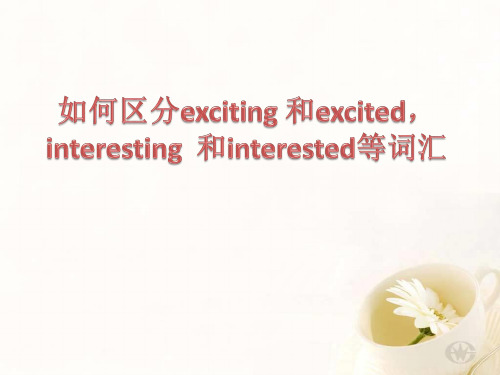
Exercise 1
请选择正确的形容词填空。
1. We are all
by the news.
以ing后缀结尾的形容词,通常用来形容事物 本身,以ed后缀结尾的形容词,通常用来形容人 或生物的感受。
The book is very interesting. She is very interested in the book.
The film is very exciting. The children are very excited.
什么情况下要用加ed的形容词,什么情 况下又要用加ing的形容词呢?怎样区分这些 形容词的用法呢?
1. The news is very surprising.(这是一则令人惊讶的新闻。) I’m very surprised. (我对这则新闻感得很惊讶。)
2. The story is very interesting. (这个故事很有趣。) I’m interested in it.(我对这个故事很感兴趣。)
请正确读出下列这些句子
1. The news is very surprising.(这是一则令人惊讶的新闻。) I’m very surprised. (我对这则新闻感得很惊讶。)
2. The story is very interesting. (这个故事很有趣。) I’m interested in it.(我对这个故事很感兴趣。)
A. exciting B. excited
2. We give our big hands for their 演).
excite的派生词汇总
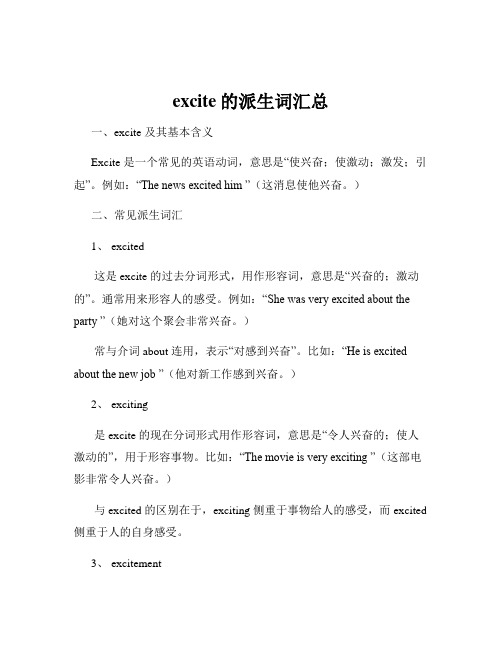
excite的派生词汇总一、excite 及其基本含义Excite 是一个常见的英语动词,意思是“使兴奋;使激动;激发;引起”。
例如:“The news excited him ”(这消息使他兴奋。
)二、常见派生词汇1、 excited这是 excite 的过去分词形式,用作形容词,意思是“兴奋的;激动的”。
通常用来形容人的感受。
例如:“She was very excited about the party ”(她对这个聚会非常兴奋。
)常与介词 about 连用,表示“对感到兴奋”。
比如:“He is excited about the new job ”(他对新工作感到兴奋。
)2、 exciting是 excite 的现在分词形式用作形容词,意思是“令人兴奋的;使人激动的”,用于形容事物。
比如:“The movie is very exciting ”(这部电影非常令人兴奋。
)与 excited 的区别在于,exciting 侧重于事物给人的感受,而 excited 侧重于人的自身感受。
3、 excitement是名词形式,意思是“兴奋;激动;刺激”。
例如:“The children shouted with excitement ”(孩子们兴奋地叫喊。
)常见短语有“in excitement ”(兴奋地),“to one's excitement ”(令某人兴奋的是)。
4、 excitable形容词,意思是“易激动的;易兴奋的”。
例如:“He is an excitable person ”(他是个易激动的人。
)5、 excitatory形容词,主要用于生物学和医学领域,表示“兴奋的;刺激性的”。
比如:“excitatory neurotransmitter ”(兴奋性神经递质)6、 excitementally是一个合成词,意思是“在精神上激励;在精神上使兴奋”。
7、 unexcited形容词,意思是“未兴奋的;不激动的”。
exciting 与excited 辨析

(1)辨析:exciting 与excited
这两个形容词都是由动词(使兴奋,使激动)变化而来的。
但二者的含义和用法不同。
exciting 意为“令人兴奋的,使人
激动的”,常作定语或表
语,作表语时主语通常是
物He told me the exciting news.
他告诉了我这个令人兴奋的消息。
The story is exciting. 这个故事振奋人心。
excited 意为“感到兴奋的,激动
的”,常作表语,主语通
常是人What are you so excited about ? 什么事使你这么激动?Everyone looked very excited . 大家都显得很兴奋。
【拓展】由动词加上-ed或-ing 转化而来的形容词有很多。
一般来说,-ed形式的形容词叙述的是人受到某事物的影响而表现出来的状态;-ing 形式的形容词描述事物本身具有的特性。
这样的单词常见的还有:
动词-ed形容词-ing形容词
interest 使感兴趣interested 感兴趣的interesting 有趣的
surprise 使惊奇surprising 吃惊的,惊奇的surprising 使人吃惊的,令人惊
奇的
amaze 使大为惊奇amazed 惊奇的,惊讶的amazing 令人惊讶的
relax (使)放松relaxed 放松的relaxing 使人放松的
embarrass 使尴尬embarrassed 尴尬的embarrassing 令人尴尬的
bore 使厌烦bored 厌倦的,烦闷的boring 令人厌烦的,无聊的。
初二下册英语第六单元讲义unit 6 词汇篇

Unit 6 词汇篇1. be weak in:在某方面薄弱如:Mary is weak in English.2. remind sb of sth: 让某人想起某事3. a little bit:有点儿,稍微4. instead of:代替,反而5. turn into:变成6. excite, excited, excitingExcite sb: 让某人兴奋excited:兴奋的,对。
感到兴奋,人做主语;exciting:兴奋的,使。
兴奋的,通常物做主语7. fall in love:爱上,喜欢上8. get married:结婚9. whole:the whole class1. 这张照片总让我想起那个假期。
The picture always that holiday.2. 不要担心。
我们可以把问题变为挑战。
Don't worry. We can problems challenges.3. 玛丽去上学了,而不是待在家里。
Mary went to school at home.4. 我们的校长通常在会议厅对所有的学生讲话。
Our principal usually school in the Assembly Hall.5. 这件夹克衫非常合我的身。
This jacket .一、单项选择1. --- Did you hear any strange when the quake happened?--- No, I was in my garden with my flowers and was enjoying the beautiful of my birds at that time.A. voice; noiseB. noise; soundC. whisper; soundD. sound; voice2. All of us feel at the good news and we laugh and laugh.A. sadB. excitedC. magicD. boring3. If you can't go to sleep, try to do something lying in bed.A. rather thanB. insteadC. instead ofD. rather4. --- Are you afraid of mice?--- Of course. But Richard is enough to catch them.A. braveB. scaredC. weakD. patient5. It took him morning to check out information.A. the whole; all theB. whole the; the allC. the whole; the allD. whole; all二、单词拼写(单句首字母填空)6. The clever Monkey King can turn himself into different animals and o .7. The emperor was really s because he wasn't wearing any clothes.8. Look at the sun! It is big and b in the sky.9. The b boy saved a little girl by jumping into the cold river.10. It is well-known that some bad people often c the children on the Internet.三、适当形式填空(单句适当形式)11. Lost in Thailand is an (excite) film. I am very (excite) about it.12. The old couple said they got (marry) 50 years ago.13. Washington (lead) the Americans to fight against the Englishmen.14. The red sun rose and (shine) on the happy village.15. The fox ran away before the hunter (shoot) it.一、单选1. I don't like cheese, because it too strong.A. soundsB. looksC. feelsD. smells2. --- have you been like this?--- For a week.A. How longB. How oftenC. How many timesD. How soon3. Mobile phones are very common now and they are than before.A. cheapB. cheaperC. cheapestD. the cheapest4. --- What did the teacher say?--- The teacher told us at the Capital Museum on time.A. arriveB. arrivedC. arrivingD. to arrive5. --- Would you like to go hiking with us?--- Sorry. My grandmother is ill. I'll go to her.A. look afterB. look forC. look atD. look up二、翻译(根据中文提示完成句子)6. I (爱上) English when I began to study it.7. When he grows up, he wants totravel (全世界).8. The couple (结婚) twenty years ago.9. Though the girl can't see, she never (放弃) her dream.10. (一切皆有可能) if you work hard.三、适当形式填空(单句适当形式)(共5小题;共5.0分)11. Can you tell me when you were (born)?12. The children are so busy that they have no time (have) a rest.13. She will call me as soon as she (get) to Hong Kong.14. By making faces he made the baby (laugh).15. It took the children two hours (finish) watching the TV program Monkey King.四、单项选择(共10小题;共10.0分)16. --- Could you tell me what's the of it?--- Well, it's an oval(椭圆形).A. timeB. dateC. shapeD. size17. --- Do you know Amy came to school this morning?--- Her bike was broken, so she had to walk.A. whyB. howC. whenD. where18. The camera is expensive I can't afford it.A. so; thatB. such; thatC. so; asD. too; to19. Tom fell love the girl last year.A. in; withB. with; inC. with; toD. and; or20. --- I am not sure which tie to wear for the party.--- God! I have no idea, .A. tooB. neitherC. eitherD. also21. You should try about the coming exam.A. don't thinkB. not to thinkC. don't to thinkD. not think22. If you bring a toy to the party, the teachers will .A. take them awayB. take it awayC. take away themD. take away it23. The girl came into the classroom, an English song happily.A. to singB. sangC. to singingD. singing24. Did you hear of the famous badminton player Super Dan?A. callingB. to callC. callsD. called25. After finishing his homework, he continued TV instead of going to sleep.A. watchingB. to watchC. watchedD. watches五、按要求转换句型(共5小题;共10.0分)26. What do you think of the TV program Monkey King? (改为同义句)do you the TV program Monkey King?27. She spent two hours in watching the cartoon movie. (改为同义句)her two hours the cartoon movie.28. It seems that Kate has supper at home. (改为同义句)Kate have supper at home.29. A traffic accident happened to him last night. (对划线部分提问)to him last night?30. Both of the girls are good at playing the violin. (改为否定句)the girls is good at playing the violin.一、单项选择(共10小题;共10.0分)1. The music always reminds me my hometown.A. withB. toC. ofD. From2. The movie was funny. I couldn't stop .A. to laughB. laughingC. laughD. laughed3. Many successful people have the same quality—they never no matter what difficulties they've had.A. give upB. stay upC. cheer up4. The rivers will become dirtier and dirtier we take action to protect them.A. sinceB. ifC. untilD. unless5. Finally, Susan got married a businessman.A. withB. ofC. toD. from6. Your dream will come true you put your heart and soul into it.A. ifB. unlessC. althoughD. until7. The child doesn't need any help. He is to look after himself.A. enough oldB. enough youngC. old enoughD. young enough8. --- I often listen to the song TwinKle Twinkle Little Star.--- So do I. It beautiful.A. feelsB. smellsC. soundsD. tastes9. We should try to think up a good way the problem.A. solvesB. to solveC. solvingD. solve10. The story is interesting many children are interested in it.A. too; toB. enough; toC. so; thatD. such; that二、完形填空(共10小题;共15.0分)Once upon a time, there was a swan(天鹅). She lived in a lake. A woman with her two daughterslived in a small house 11 the lake. They lived a hard life. Sometimes they 12 money to buy food.The swan was 13 to see that. She 14 to help them. Every day she came to the woman's house and left a golden feather(羽毛) without 15 anything. The woman sold the feather 16 bought food. She was happy because her life was17 than before.But the woman became greedy(贪婪的). One day when the swan 18 , the woman caught(捉住) her and took all her golden feathers. Suddenly the golden feathers19 common(普通的) feathers.The swan said, "I came to help you, but you wanted to kill(杀) 20 . I will never come back. Never be greedy." With these words, the swan disappeared(消失).11. A. under B. near C. in D. by12. A. haven't B. don't have C. didn't have D. has13. A. unhappy B. friendly C. happy D. unfriendly14. A. continued B. decided C. rushed D. hurried15. A. seeing B. saying C. bringing D. hurrying16. A. but B. so C. because D. and17. A. better B. good C. best D. well18. A. jumped B. came C. hurried D. cried19. A. changed into B. picked upC. again and againD. took around20. A. him B. her C. I D. me三、阅读理解(共5小题;共10.0分)Many years ago, there was an old man who had four sons. He wanted his sons to learn not to judge(判断) things too quickly. So he told them to go and look at a pear tree. It was far away from his home. The first son went in winter, the second in spring, the third in summer, and the youngest son in autumn.When the sons came back, the old man asked them to say what they had seen.The first son complained the tree was ugly. The second son said the tree was covered with buds and full of hope. The third son said the tree was full of green leaves. They looked so beautiful, and it was the most wonderful thing he had ever seen. The youngest son said that the tree was bowed down with heavy fruits. It was full of life and fulfillment(收获).The man explained that all of his sons were right, but each of them had seen just one season of the tree. He told them that they couldn't judge a tree or a person by only one season. "If you give up when it's winter, you will miss the hope of your spring, the beauty of your summer, and the fulfillment of your autumn," said the old man.It is true that we shouldn't let the hard season break the happiness of the other seasons. Never give up during the difficult days and better times are sure to come some day.21. Why did the old man ask his sons to look at the pear tree?A. Because he liked eating pears.B. Because the tree was important to his family.C. Because he wanted to teach them not to judge things too quickly.D. Because his sons didn't judge things quickly.22. The fourth son went to see the tree in .A. springB. summerC. autumnD. winter23. The underlined word "buds" probably means in Chinese.A. 叶子B. 枝条C. 果实D. 花蕾24. Which of the following is TRUE?A. The pear tree was near his home.B. The third son said the tree was beautiful.C. The four sons all liked the tree.D. Even you give up in winter, you can still get hope in other seasons.25. What's the main idea of this passage?A. Don't judge a life by one difficult season.B. Father's love is great.C. Every tree has four seasons.D. Life is different for everyone.。
excite,excited,exciting意思及用法的区别
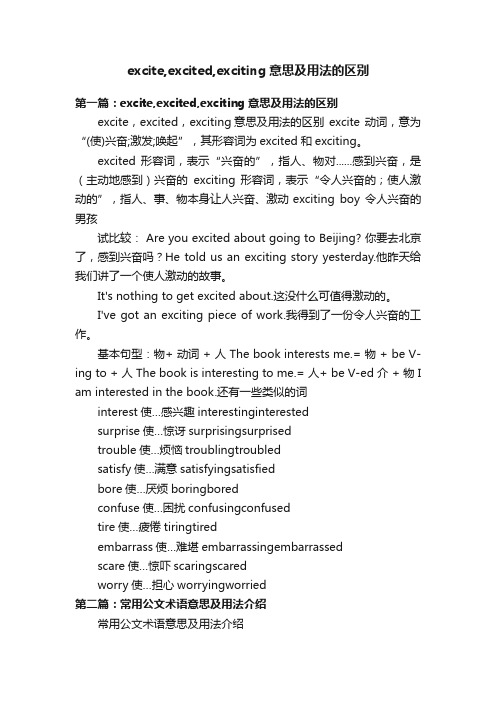
excite,excited,exciting意思及用法的区别第一篇:excite,excited,exciting意思及用法的区别excite,excited,exciting意思及用法的区别excite 动词,意为“(使)兴奋;激发;唤起”,其形容词为excited和exciting。
excited 形容词,表示“兴奋的”,指人、物对......感到兴奋,是(主动地感到)兴奋的exciting 形容词,表示“令人兴奋的;使人激动的”,指人、事、物本身让人兴奋、激动exciting boy 令人兴奋的男孩试比较: Are you excited about going to Beijing? 你要去北京了,感到兴奋吗?He told us an exciting story yesterday.他昨天给我们讲了一个使人激动的故事。
It's nothing to get excited about.这没什么可值得激动的。
I've got an exciting piece of work.我得到了一份令人兴奋的工作。
基本句型:物+ 动词 + 人 The book interests me.= 物 + be V-ing to + 人 The book is interesting to me.= 人+ be V-ed 介 + 物 I am interested in the book.还有一些类似的词interest使…感兴趣interestinginterestedsurprise使…惊讶surprisingsurprisedtrouble使…烦恼troublingtroubledsatisfy使…满意satisfyingsatisfiedbore使…厌烦boringboredconfuse使…困扰confusingconfusedtire使…疲倦tiringtiredembarrass使…难堪embarrassingembarrassedscare使…惊吓scaringscaredworry使…担心worryingworried第二篇:常用公文术语意思及用法介绍常用公文术语意思及用法介绍1.〔案〕记录、存查的意思,也指专门办理的案子。
excited和exciting的区别

excited和exciting的区别excited 和exciting 的区别We are all ____ at the ___ news.A. exciting excitingB. excited excitedC. exciting excitedD. excited exciting这两词有何区别,这道题应选哪个答案,请高手举例说明!问题涉及了英语动词形容词的两种形式,一种是过去分词作形容词,一种是现在分词作形容词。
一般来说,过去分词的形容词,多形容人或其他生物的情绪或感受,对于被修饰的对象来说,这种形容词体现了它的主观感受。
如:I am interested in this book。
现在分词的形容词,多形容客观事物体现在外的性质,其修饰的对象多不具有生命。
如:I couldn‘t forget the interesting story you had told。
关于问题,很显然,主语we是人,形容人的主观感受,用excited;news是客观事物,描述客观事物的属性的,应用exciting。
所以正确答案是D。
excited 是形容人的兴奋。
exciting 是形容事情的兴奋。
一招~很容易记忆的excited一般用来修饰人的~相反exciting是用来修饰物的~这样就容易理解了~指人用ed,指物用ing,excited在句子中指人的心情.exciting在句子中指事物的反应excite是使役动词,翻译成中文就是使...激动的意思,所以形容人的情绪时就是用被动态的分词,在形容事件让人激动就用ing形式ing 形式和ed 形式虽然都是作形容词,但是在意义上是有区别的。
ing形式做定语,意义上接近一个定语从句,表示一个正在进行的动作或表示一个主动的动作如: China is a developing country=China is a country which is developing)ed式的则通常表示已发生的或已结束的动作,ing则表示正在发生的如:boiled water开过了的水,白开水。
七年级下册英语重点单词用法归纳
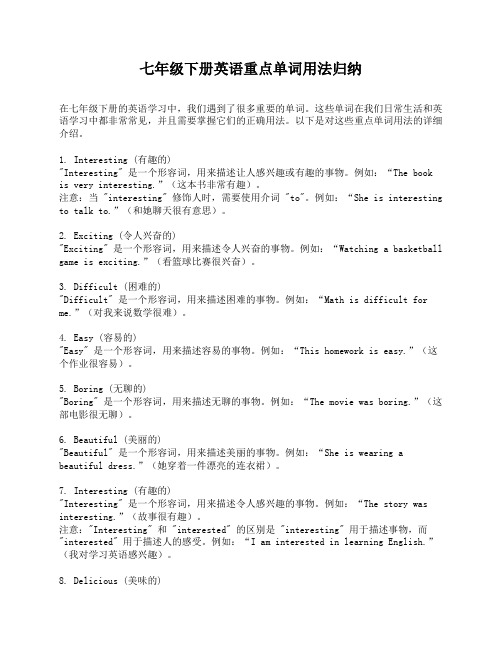
七年级下册英语重点单词用法归纳在七年级下册的英语学习中,我们遇到了很多重要的单词。
这些单词在我们日常生活和英语学习中都非常常见,并且需要掌握它们的正确用法。
以下是对这些重点单词用法的详细介绍。
1. Interesting (有趣的)"Interesting" 是一个形容词,用来描述让人感兴趣或有趣的事物。
例如:“The book is very interesting.”(这本书非常有趣)。
注意:当 "interesting" 修饰人时,需要使用介词 "to"。
例如:“She is interesting to talk to.”(和她聊天很有意思)。
2. Exciting (令人兴奋的)"Exciting" 是一个形容词,用来描述令人兴奋的事物。
例如:“Watching a basketball game is exciting.”(看篮球比赛很兴奋)。
3. Difficult (困难的)"Difficult" 是一个形容词,用来描述困难的事物。
例如:“Math is difficult for me.”(对我来说数学很难)。
4. Easy (容易的)"Easy" 是一个形容词,用来描述容易的事物。
例如:“This homework is easy.”(这个作业很容易)。
5. Boring (无聊的)"Boring" 是一个形容词,用来描述无聊的事物。
例如:“The movie was boring.”(这部电影很无聊)。
6. Beautiful (美丽的)"Beautiful" 是一个形容词,用来描述美丽的事物。
例如:“She is wearing a beautiful dress.”(她穿着一件漂亮的连衣裙)。
7. Interesting (有趣的)"Interesting" 是一个形容词,用来描述令人感兴趣的事物。
excited__exciting区别
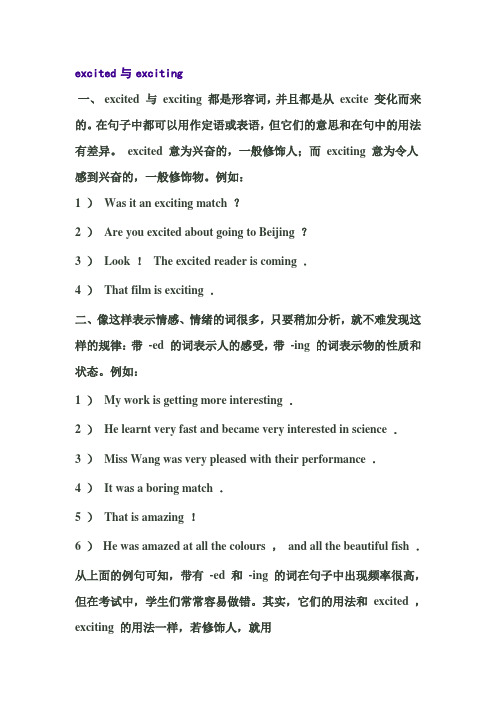
excited与exciting一、excited 与exciting 都是形容词,并且都是从excite 变化而来的。
在句子中都可以用作定语或表语,但它们的意思和在句中的用法有差异。
excited 意为兴奋的,一般修饰人;而exciting 意为令人感到兴奋的,一般修饰物。
例如:1 )Was it an exciting match ?2 )Are you excited about going to Beijing ?3 )Look !The excited reader is coming .4 )That film is exciting .二、像这样表示情感、情绪的词很多,只要稍加分析,就不难发现这样的规律:带-ed 的词表示人的感受,带-ing 的词表示物的性质和状态。
例如:1 )My work is getting more interesting .2 )He learnt very fast and became very interested in science .3 )Miss Wang was very pleased with their performance .4 )It was a boring match .5 )That is amazing !6 )He was amazed at all the colours ,and all the beautiful fish .从上面的例句可知,带有-ed 和-ing 的词在句子中出现频率很高,但在考试中,学生们常常容易做错。
其实,它们的用法和excited ,exciting 的用法一样,若修饰人,就用-ed 形式的词,若修饰物就用-ing 形式的词。
三、初中英语课本中出现过的类似词语有:interest → interested/interesting (感兴趣的/有趣的)excite → excited /exciting (兴奋的/令人兴奋的)move → moved/moving (感动的/令人感动的)surprise → surprised /surprising (感到惊奇的/使人惊奇的)please → pleased/pleasing (高兴的/令人高兴的)bore → b ored/boring (厌烦的/令人厌烦的)tire → tired /tiring (厌倦的/令人厌倦的)amaze → amazed /amazing (惊奇的/令人惊奇的)frighten → frightened/frightening (受惊恐的/令人惊恐的)puzzle → puzzled/puzzling (迷惑的/令人迷惑的)练习:用每题后括号中所给单词的适当形式填空。
Exciting与excited只是课件

• 2)bored为bore的过去分词形式,意思是“感到厌 烦的”, 修饰人,做表语或定语。如:① I’m bored. Let’s go to the cinema.我闷了 ② I hope you’re not getting bored of my conversation.话没让你烦 3)boring 为表示主动意义的形容词,有“令人厌 烦”的意思,多作定语与表语,修饰物。如: ①
• 1. Tom always works at night and _________during the day.
• 2. Does he want to _______today?
• 3. Look! The children __________on the beach.
• 4. What a _______day! We don't have too much homework.
The film is so boring. 电影太乏味了. ② I’m bored with so many boring things . 我厌倦 了乏味的事情。
• 1. I like English, but I’m really ___ of ___ grammar. A tired; boring B tiring; boring
• 再如:exciting 令人兴奋的,激动人心的。 An exacting news 一个激动人心的消息, excited兴奋的。 He is excited at the news 他对这个消息感 到兴奋。
It is exciting news 这是振奋人心的好消息。
relax,relaxed,relaxing的区别和语 法
a. be interested in sth.对某事感兴趣 b. be interested in doing sth. 对做某事感兴 趣
二、excite, exciting与excited的区别
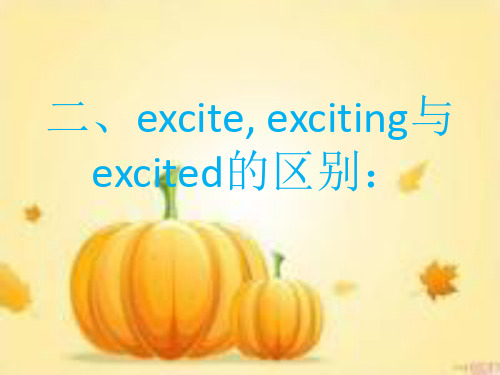
See you later!
练习:用exciting或ited填空:
1. I was ______ about the news. 2. He is an ______ boy. 3. He told us an ______ story yesterday. 4. Li Lei is very ______ about his exam. 5. This is an ______movie.
二、excite, exciting与 excited的区别:
三者都有“令人兴奋,使激动”的意思。exciting与 interesting;excited与 interested用法相同。 1、excite作动词 “令人兴奋,使激动”,它是exciting 与excited的原形。在英语中极少使用它。 2、exciting"令人兴奋的;使人激动的" 为形容词,表示 人、事、物本身让人兴奋、激动 (即主语使人/物感到 兴奋、激动)。主语一般为物。 例:The news made me exciting. 3、excited “令人兴奋的;使人激动的”为形容词, 指人、物对......感到兴奋,是(主动地感到)兴奋, 主语一般为人。例:Are you excited about going to Beijing?
exciting和excited的区别是什么

exciting和excited的区别是什么excited修饰人或带有拟人手法的物,exciting修饰物。
excited 意思是激动的、兴奋的、受刺激的、紧张不安的。
exciting令人激动的、使人兴奋的。
二者区别1.excited意为兴奋的,激动的;exciting意为令人兴奋的,使人激动的。
2.excited修饰人或带有拟人手法的物;exciting修饰物。
例句:Are you excited about going to beijing?要去北京了,你激动吗?That filim is exciting.这电影真令人兴奋。
形容词作定语的三种后置1.形容词短语作定语时要后置。
如:Ithinkheisamansuitableforthejob.我认为他是适合做这项工作的人。
2.表语形容词作定语要后置。
如:He spoke like a man afraid.他说话时像是很害怕似的。
3.受修饰复合不定代词时后置。
如:Tell me something interesting.给我说些有意思的事。
形容词的一般用法1.作定语,一般放在所修饰词的前面。
2.作表语,放在系动词的后面。
3.形容词修饰something,anything,nothing,everything等复合不定代词时,须放在其后。
4.表示长、宽、高、深及年龄的形容词,应放在相应的名词之后。
5.只能作表语的形容词:afraid害怕;alone独自的;asleep睡着的;awake醒着的;alive活着的;well健康的;ill病的;frightened 害怕的。
6.只能作定语的形容词:little小的;only唯一的;wooden木质的;woolen羊毛质的;elder年长的。
7.貌似副词的形容词:lonely独自的;friendly友好的;lively生动的;lovely可爱的。
8.复合形容词:snow-white雪白的、English-speaking说英语的、full-time全日制的、well-known众所周知的、kind-hearted善良的;man-made人造的、take-away可以带走的、ten-year-old十岁的。
exciting和excited的用法

exciting和excited的用法
exciting和excited都表示激动、兴奋的意思。
只不过表示的对象不同,exciting表示某事物令人兴奋,而excited的对象是人。
exciting例句
1、This piece of equipment is an exciting new development.
这台设备是一项振奋人心的最新研究成果。
2、This is one of the most exciting developments in biology in recent years.
这是近年来生物学上令人振奋的发展之一。
3、The course offers a range of exciting possibilities for developing your skills.
这门课程可提供一整套新鲜活泼的技能训练。
excited例句
1、The new restaurant is nothing to get excited about.
这家新餐馆没什么值得特别激动的地方。
2、I'm really excited at the prospect of working abroad.
我对有希望到国外工作着实很激动。
3、The prospect of a year in India greatly excited her.
有望在印度待上一年使她激动万分。
excited与exciting及其它
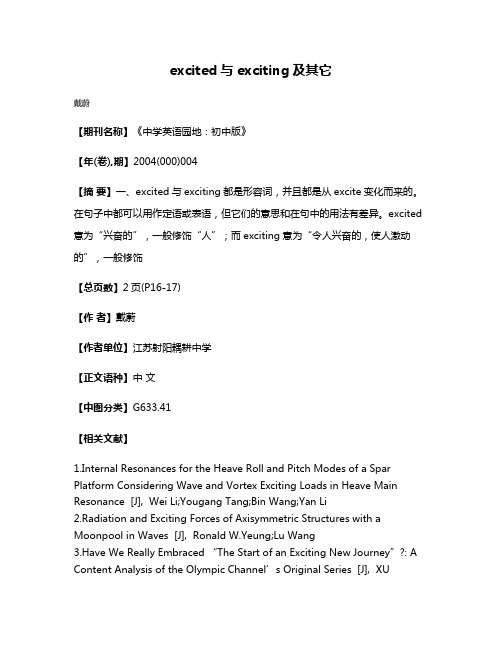
excited与exciting及其它戴蔚【期刊名称】《中学英语园地:初中版》【年(卷),期】2004(000)004【摘要】一、excited与exciting都是形容词,并且都是从excite变化而来的。
在句子中都可以用作定语或表语,但它们的意思和在句中的用法有差异。
excited 意为“兴奋的”,一般修饰“人”;而exciting意为“令人兴奋的,使人激动的”,一般修饰【总页数】2页(P16-17)【作者】戴蔚【作者单位】江苏射阳耦耕中学【正文语种】中文【中图分类】G633.41【相关文献】1.Internal Resonances for the Heave Roll and Pitch Modes of a Spar Platform Considering Wave and Vortex Exciting Loads in Heave Main Resonance [J], Wei Li;Yougang Tang;Bin Wang;Yan Li2.Radiation and Exciting Forces of Axisymmetric Structures with a Moonpool in Waves [J], Ronald W.Yeung;Lu Wang3.Have We Really Embraced “The Start of an Exciting New Journey”?: A Content Analysis of the Olympic Channel’s Original Series [J], XUMingming; Yangchen Dolma4.Unit 5 Reading An exciting job教学设计 [J], 张弘;钱剑英(指导)5.Unit 5 Reading An exciting job教学设计 [J], 张弘因版权原因,仅展示原文概要,查看原文内容请购买。
excited的动词

excited的动词Excited这个词通常被认为是一个形容词,用来形容某个人或事物的兴奋状态。
但实际上,excited也可以是一个动词,用来描述引起兴奋的行为或事件。
在本文中,我们将探讨一些常见的excited动词,以及它们的用法和意义。
1. ExciteExcite是最常见的excited动词之一,意为“激发、引起兴奋”。
例如:- The new movie trailer has really excited me.(新电影预告片让我非常兴奋。
)- The prospect of a holiday in the sun excited the whole family.(一家人都因为有望在阳光下度假而感到兴奋。
)2. ThrillThrill也是一个常见的excited动词,意为“使激动、使兴奋”。
例如:- The rollercoaster ride thrilled me to the core.(过山车的骑行让我激动不已。
)- The news of her promotion thrilled her colleagues.(她晋升的消息让同事们感到非常兴奋。
)3. StimulateStimulate意为“刺激、激励”,通常用于描述某种行为或事件对某人的心理或身体状态产生的刺激作用。
例如:- The spicy food stimulated my taste buds.(辛辣的食物刺激了我的味蕾。
)- The challenging puzzle stimulated my brain.(富有挑战性的拼图激发了我的大脑。
)4. GalvanizeGalvanize意为“激励、鼓舞”,通常用于描述某个事件或行为对某人的积极影响。
例如:- The success of his friend's business venture galvanized him to start his own.(他朋友的商业冒险的成功激励他开始自己的事业。
excited动词形式

excited动词形式Excited是一个常用的形容词,意思是“激动的、兴奋的”。
它可以用来形容人、事物、场合等等,是生活中常用的词汇。
除了作为形容词之外,excited还可以变成动词形式。
Excited作为动词,意思是“使兴奋、激动”。
它的动词形式是excite,它是一个及物动词,需要跟上宾语。
它的过去式是excited,过去分词是excited。
Excite在英语中的使用十分广泛,下面我们就来看看几个例子。
1. Excite someone’s interestExcite可以用来表示“激发某人的兴趣”。
比如:His speech excited my interest in politics.(他的演讲激发了我对政治的兴趣)The teacher tried to excite the students’ curiosity about the topic.(老师试图激发学生对这个话题的好奇心)2. Excite someone’s emotionExcite也可以表示“激发某人的情感”。
比如:The music excited my emotion and brought tears to my eyes.(这首音乐激发了我的情感,让我热泪盈眶)The news excited her emotion and made her jump with joy.(这个消息激发了她的情感,使她欣喜若狂)3. Excite someone’s imaginationExcite还可以表示“激发某人的想象力”。
比如:The book excited my imagination and took me to a different world.(这本书激发了我的想象力,带我去了一个不同的世界)The movie excited my imagination and made me think about the future.(这部电影激发了我的想象力,让我思考未来)除了以上的例子之外,excite还可以用来表示“激励、鼓舞”等意思。
- 1、下载文档前请自行甄别文档内容的完整性,平台不提供额外的编辑、内容补充、找答案等附加服务。
- 2、"仅部分预览"的文档,不可在线预览部分如存在完整性等问题,可反馈申请退款(可完整预览的文档不适用该条件!)。
- 3、如文档侵犯您的权益,请联系客服反馈,我们会尽快为您处理(人工客服工作时间:9:00-18:30)。
See you later!
2、exciting"令人兴奋的;使人激动的" 为形容词,表示 人、事、物本身让人兴奋、激动 (即主语使人/物感到 兴奋、激动)。主语一般为物。
例:The news made me exciting. 3、excited “令人兴奋的;使人激动的”为形容词, 指人、物对......感到兴奋,是(主动地感到)兴奋, 主语一般为人。例:Are you excited about going to Beijing?
二、excite, exciting与 excited的区别:
三者都有“令人兴奋,使激动”的意思。xcited与 interested用法相同。
1、excite作动词 “令人兴奋,使激动”,它是exciting 与excited的原形。在英语中极少使用它。
练习:用exciting或excited填空:
1. I was ______ about the news. 2. He is an ______ boy. 3. He told us an ______ story yesterday. 4. Li Lei is very ______ about his exam. 5. This is an ______movie.
